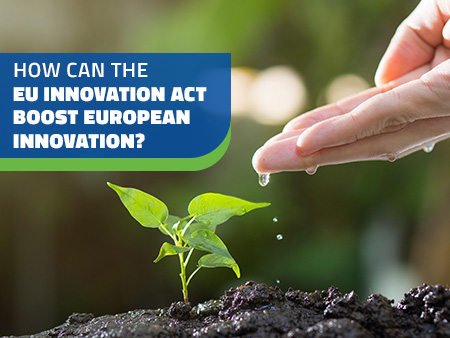EIT Statement on the EU Innovation Act: Building a Stronger European Innovation Ecosystem

The European Institute of Innovation and Technology (EIT) welcomes the European Commission’s work on the upcoming EU Innovation Act, a timely and ambitious initiative to strengthen Europe’s innovation capacity and competitiveness.
Following the Commission’s call for evidence and public consultation in July 2025, the EIT has issued its official statement highlighting priorities for a more connected, inclusive and investment-ready European innovation landscape.
A Timely Step to Boost Europe’s Innovation Power
A key deliverable of the EU Startup and Scale-up Strategy, the Innovation Act aims to help innovative ideas reach the market faster. It will address long-standing challenges such as fragmented markets, limited finance for intangibles, and slow uptake of new technologies.
As Europe’s largest innovation ecosystem, the EIT and its nine Knowledge and Innovation Communities (KICs) have supported thousands of startups, scale-ups, and innovation projects since the EIT’s establishment in 2008. Drawing on this experience, the EIT sees the Innovation Act as an opportunity to ensure Europe’s innovation policies remain globally competitive, inclusive and sustainable.
Removing Barriers and Enabling Scale
Scaling innovations across Europe remains too costly and complex. The EIT calls for simpler, innovation-friendly rules – for example, mutual recognition of pilot projects, regulatory sandboxes, and a possible Single Market passport for validated innovative solutions.
Regulations should be designed to enable innovation, not restrict it. The EIT also supports assessing the impact of proposed regulations on innovation and exploring an EU-wide framework for testing and scaling cross-border solutions.
Beyond removing barriers, the Innovation Act should also help create the conditions for European-based firms to grow into global technology leaders. Europe has a strong base of startups and scale-ups, but too few achieve global reach due to fragmented markets and limited access to deep, long-term capital. Strengthening coordination between EU instruments and expanding access to patient investment, can help ambitious ventures scale within Europe and compete globally.
Financing the Intangible Economy
Europe’s most innovative firms increasingly depend on intangible assets such as intellectual property (IP), data and skills. Yet financing frameworks still prioritise physical collateral.
The EIT recommends developing standardised valuation methods for IP and data in collaboration with the European Union Intellectual Property Office (EUIPO) and the European Patent Office (EPO), alongside clear collateral frameworks to help banks and investors better assess intangible assets and make them more reliable for investment. Aligning EU instruments such as the EIT, the European Innovation Council (EIC), the European Investment Fund (EIF) and InvestEU around these standards would improve access to patient capital for startups and scale-ups.
Using Public Procurement to Drive Innovation
Public procurement – representing around 14% of EU GDP – remains an underused lever for innovation. The Act should promote outcome-based procurement and encourage public authorities and corporates to act as early adopters. Simpler, innovation-friendly procurement rules would make it easier for startups to access markets and help turn public investment into a driver of industrial innovation and technology transfer.
Strengthening Inclusiveness and Regional Balance
Evidence from the EIT’s work shows that innovation remains concentrated in a few regions. To build a truly European ecosystem, the Act should support cross-border collaboration and diffusion of innovation across all Member States. Diversity, inclusion and gender balance must be central principles. Through the EIT Regional Innovation Scheme (RIS), the EIT stands ready to provide proven tools for helping innovators from widening countries access EU and global markets.
From Innovation to Impact
By simplifying cross-border scaling, unlocking finance for intangibles, and using procurement to stimulate demand, the EU Innovation Act can transform Europe’s strong research base into faster market adoption and globally competitive companies.
The EIT and its nine KICs stand ready to share data, evidence and lessons from more than a decade of work to support the European Commission in shaping and implementing this key policy initiative.


 Share this page
Share this page


